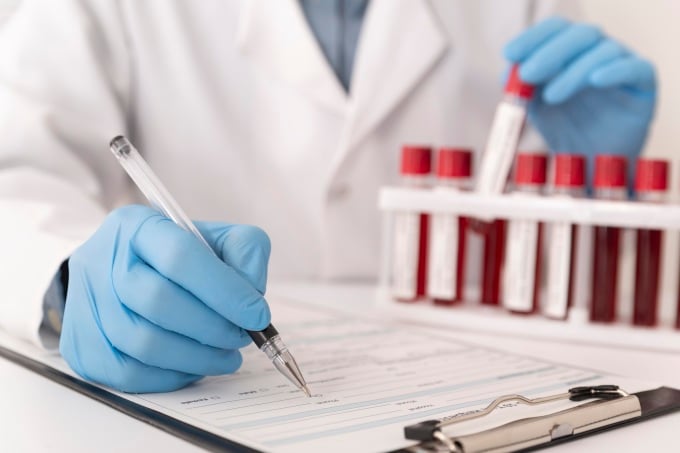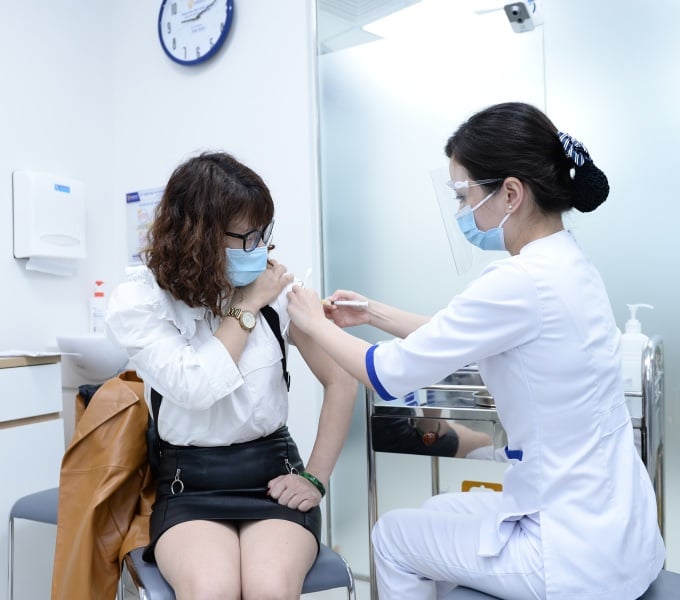Quick first aid, blood tests, vaccinations... are steps to take to protect your health when you suspect you have been exposed to the hepatitis B virus.
Doctor, PhD Vu Truong Khanh (Head of Gastroenterology Department, Tam Anh General Hospital , Hanoi ) said that hepatitis B virus has a silent progression, the signs of recognition are not clear, so the possibility of cross-infection in the community is high. Hepatitis B virus (HBV) lives a very long time and is persistent, it can survive outside the body when blood has dried for up to 7 days.
Anyone can be exposed to HBV through contact between damaged skin or mucous membranes (eyes, nose, mouth) and blood, tissue or body fluids (semen, vaginal secretions) of an infected person through unprotected sexual intercourse, use or injury by unsterilized medical instruments. Sharing razors, toothbrushes, blood sugar testing equipment or dental treatments, cosmetic services (nail salons, tattoos, ear piercings...) if using unsterilized instruments and machines can also spread the disease.
HBV has an incubation period of about 3-6 months, depending on the physical condition, after which it becomes active and causes acute hepatitis B. If after 6 months, the body cannot immunize itself against the virus, the disease will progress to the chronic stage. The disease often begins with symptoms of mild fever, loss of appetite, indigestion, bloating, digestive disorders, lasting from several weeks to 6 months. After about 7-10 days of jaundice, the patient's fever will subside. However, according to Dr. Khanh, HBV only shows symptoms in about 30-50% of cases. Many people with hepatitis B have no symptoms, but can still transmit the virus to others. When suspecting HBV exposure, doctors suggest quickly taking the following steps:
First aid for exposed area
First aid treatment of HBV exposure varies depending on the type of exposure and the means of exposure (mucous membranes, intact skin, or damaged skin).
If the injury is caused by a needle or sharp object, you should immediately wash the injured skin area with soap under running water; let the blood from the wound flow naturally, do not squeeze or squeeze the wound.
If blood or body fluids from a person suspected of being infected with HBV splash onto a broken skin area, you should immediately wash the broken skin area with soap under running water. Never rub, scrub or apply antiseptic to the broken skin area.
If blood or body fluids get into your eyes, do not rub them. Rinse gently but thoroughly with running water or sterile 0.9% saline for at least 15 minutes.
If blood or body fluids splash into your mouth or nose, rinse your mouth with water several times; rinse your nose with sterile 0.9% saline. Do not brush your teeth or use disinfectants.
If blood or body fluids splash onto healthy skin, you should wash the contaminated area with soap under running water, do not rub vigorously to avoid injury.
Blood test
HBV has 3 types of antigens: HBsAg, HBeAg and HBcAg, corresponding to 3 types of antibodies: anti-HBs, anti-HBc and anti-HBe. The presence of these antigens and antibodies is important in determining the disease, the type of disease, and the progression of the disease. After performing the above first aid steps, you need to do a blood test to check for the presence of HBV after 1-9 weeks of exposure. Usually, the doctor will examine HBsAg and ALT. You should fast 4-6 hours before the blood test and do the test after 6 months to re-evaluate.

Blood test to check for the presence of hepatitis B virus. Photo: Freepik
Prophylactic treatment with vaccine, hepatitis B immune globulin
Hepatitis B immune globulin (HBIG) is often used for prophylaxis immediately after exposure to blood or body fluids of a person infected with hepatitis B virus. For example, children born to mothers with HBsAg positive, medical staff exposed to the blood of an infected person, after sexual intercourse with an infected person...
According to Dr. Khanh, if the HBsAg test is negative, it means you do not have the disease. However, you still need to get vaccinated against hepatitis B virus to prevent infection if the test does not show antibodies (anti-HBs). If you have been vaccinated, you should check your viral antibodies to see if they are still strong enough. If the anti-HBs antibody level is above 10 mIU/mL, it means you have reached the protective immunity level and do not need to get vaccinated or HBIG again.
If you have not been vaccinated, are not sure if you have been vaccinated, or do not have protective immunity, you should receive a dose of HBIG within the first 24 hours after suspected exposure (200-400 IU), and at the same time receive the hepatitis B vaccine at a different injection site. HBIG will no longer be effective in preventing infection after 14 days of sexual contact with a person infected with hepatitis B virus or after 7 days of exposure to HBV through blood or mother-to-child transmission.
You will need to get 3 doses of the vaccine within 6 months as scheduled by your doctor. If you have a history of not responding to the hepatitis B vaccine, you will need to get another dose of HBIG the following month.

Hepatitis B vaccination helps prevent infection. Photo: VNVC
Actively prevent infection in the community
When you suspect exposure to HBV, you should proactively limit direct contact with others, especially when you have open wounds. Men and women should practice safe sex by using condoms; do not share personal items such as toothbrushes, razors, nail clippers... to avoid infection. If you are pregnant or intend to become pregnant, women should inform their doctor to have a plan to prevent infection from mother to child.
Dr. Khanh said that pregnant women with hepatitis B virus have a high rate of HBV infection to the fetus, increasing gradually from pregnancy to birth. The infection rate in the last 3 months increases to 60-70%. The risk of newborns being infected is up to 90% if there are no timely protective measures immediately after birth. About 50% of these children may have chronic hepatitis B virus, with a risk of developing cirrhosis in adulthood.
Adhere to treatment regimen
Complying with the doctor's treatment regimen such as regular check-ups, taking medication as prescribed, combining a healthy lifestyle and a scientific diet can control the virus that causes the disease and improve the immune system. People exposed to HBV, if not treated promptly and properly, can develop acute hepatitis B and have a high risk of becoming chronic if exposed in adulthood, which can lead to cirrhosis or liver cancer.
Trinh Mai
Source link


![[Photo] General Secretary To Lam visits Kieng Sang Kindergarten and the classroom named after Uncle Ho](https://vphoto.vietnam.vn/thumb/1200x675/vietnam/resource/IMAGE/2025/10/09/1760023999336_vna-potal-tong-bi-thu-to-lam-tham-truong-mau-giao-kieng-sang-va-lop-hoc-mang-ten-bac-ho-8328675-277-jpg.webp)


![[Photo] President Luong Cuong attends the 80th Anniversary of the Traditional Day of Vietnamese Lawyers](https://vphoto.vietnam.vn/thumb/1200x675/vietnam/resource/IMAGE/2025/10/09/1760026998213_ndo_br_1-jpg.webp)
![[Photo] Prime Minister Pham Minh Chinh chairs a meeting of the Government Standing Committee on overcoming the consequences of natural disasters after storm No. 11](https://vphoto.vietnam.vn/thumb/1200x675/vietnam/resource/IMAGE/2025/10/09/1759997894015_dsc-0591-jpg.webp)
























































































Comment (0)